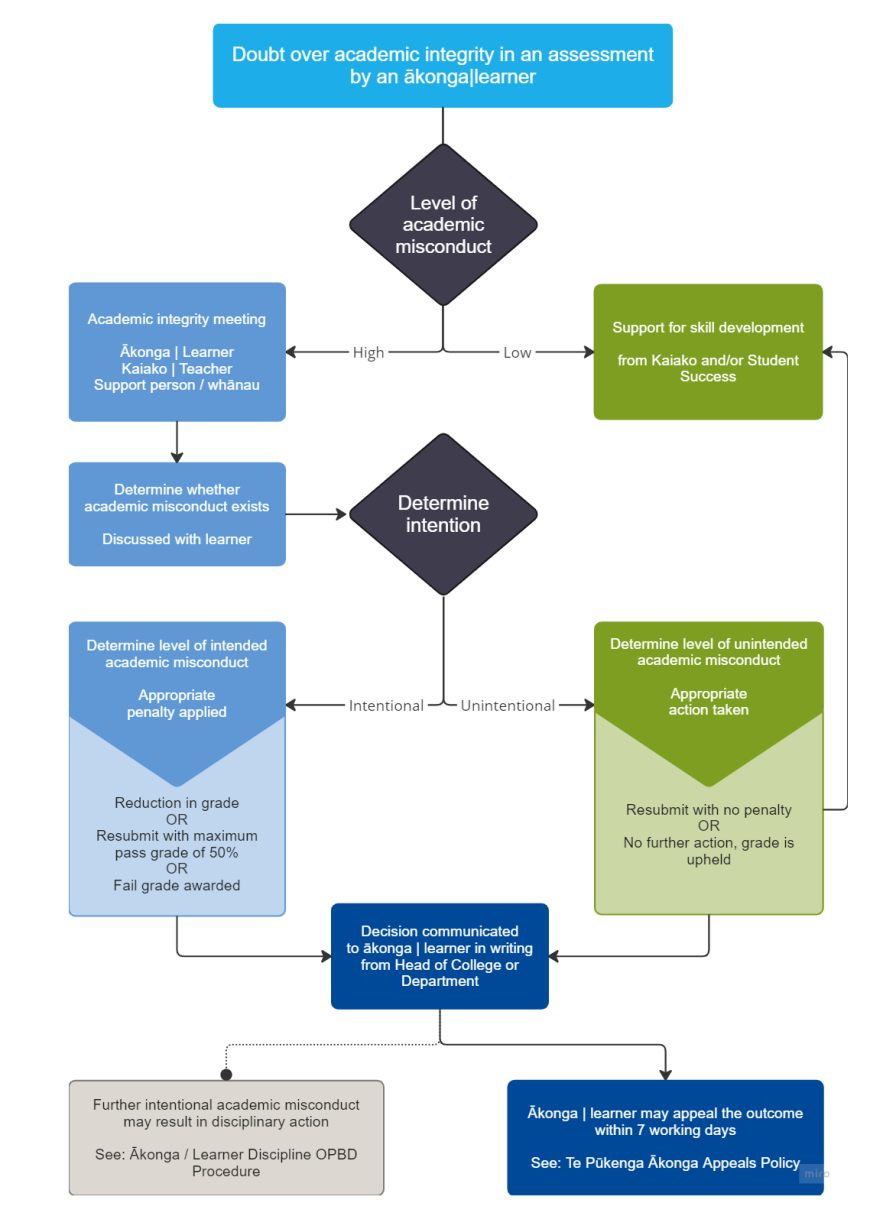To provide operational procedures that uphold ākonga academic integrity at the Otago Polytechnic Business Division of Te Pūkenga (OPBD).
Academic Integrity - Te Pūkenga Policy and OPBD Procedure
Te Pūkenga Academic Integrity Policy
Parts 7.7 of Te Kawa Maiorooro | Educational Regulatory Framework (TKM)
The relevant Te Pūkenga Academic Policies, current Otago Polytechnic policies (as per Te Pūkenga Transitioning (Grandparenting) of Former Subsidiaries Policy) and the relevant Otago Polytechnic Business Division Procedures.
1. Learners (ākonga) are expected to follow the principles of academic integrity in all learning and assessment activities as outlined in TKM Academic Integrity, Section 6.8.
1.1 Kaiako will (also refer to Appendix 1)
a. Support ākonga to reference sources appropriately, providing formative learning opportunities and materials that develop an understanding of all aspects of correct referencing.
b. Follow the process detailed in this procedure (refer to Appendix 2) when they have doubts about the authorship of ākonga work, on the basis of observed copying or illicit exchange of information, absent referencing, differences in the level of language, recognition of previously published text, or any other indicator.
c. Ensure serious breaches or repeated breaches of academic integrity are managed in accordance with the Ākonga/Learner Discipline - OPBD Procedure.
d. Remain up-to-date with variants of breaches of academic integrity that emerge with technology and changing ākonga context.
e. Assess the level of suspected breach/es of academic integrity, prepare evidence, and discuss with Programme Head/or equivalent in the first instance.
2. Where the breach of academic integrity is considered to be unintentional, the work will be assessed as is and kaiako will provide explanation and guidance to ākonga on the academic integrity issues.
3. Where doubt persists, or ākonga repeatedly breaches academic integrity, the evidence and its context should be provided to the Head of College by the Programme Head for review and depending on the degree of breach of academic integrity, the matter may be referred to Te Kaihāpai.
4. A meeting is to be arranged with ākonga, ākonga support, kaiako and/or the Programme Head and/or Head of College to discuss the alleged breach/es of academic integrity.
4.1 Where breach/es of academic integrity are established, ākonga may be instructed to resubmit the assessment if allowed by the programme regulations.
4.2 Other actions can include awarding a reduced grade or awarding a failing mark/grade.
5. Where the breach/es of academic integrity is deemed serious, the Head of College or equivalent must discuss the situation with the Te Kaihāpai.

-
Otago Polytechnic Business Division Procedures
- Assessment and Moderation - OPBD Procedure
- Impaired Performance/Aegrotat - OPBD Procedure
- Ākonga/Learner Discipline - OPBD Procedure
Te Pūkenga Policies
- Te Pūkenga Kaupapa-here | Ākonga Appeals Policy
- Te Pūkenga Kaupapa-here | Ākonga Concerns and Complaints Policy
Other References and Resources
Minimising Plagiarism Expectations for Management, Kaiako, and Ākonga
Each group could have specific responsibilities, for example.
Management:
Have developed this procedure and flowchart (refer to Appendix 2) that are to be read in conjunction with TKM which clearly defines plagiarism and describes the responsibilities of ākonga and kaiako.
- Provide plagiarism detection software and monitor referencing practices.
- Adopt a specific referencing system such as American Psychological Association (APA) for internal OPBD documents.
- Model appropriate referencing protocols.
Kaiako:
- Provide accurate and up-to-date information on academic integrity and facilitate understanding of plagiarism to ensure that ākonga understands the benefits of expressing information in their own words.
- Provide ākonga with copies of, or hyperlinks to, relevant sections of TKM and Academic Integrity - OPBD Procedures.
- Engage ākonga in discussions about both TKM and Academic Integrity OPBD procedure.
- Explain the institution’s attitude towards plagiarism.
- Discuss the consequences of plagiarising material, including material from the web.
- Provide ākonga with a copy of their programme of study’s guidelines on referencing.
- Make clear the difference between intentional plagiarism and incorrect acknowledgement of a paraphrased source.
- Teach ākonga how to reference both print-based and electronically accessed material.
- Advise ākonga about the range of web-based mechanisms, including Turnitin, which will be used to detect plagiarism in assessments.
- Model appropriate academic referencing systems such as APA and show examples where references increased grades.
- Reference all sources used in all learning and teaching resources including but not limited to personal and course handouts, overhead transparencies, and PowerPoint presentations, pictures/images.
- Introduce a peer monitoring system that focuses on referencing practice.
- Explain the difference between authorised and unauthorised collaboration during assessment activities.
Ākonga:
- Know and always observe the rules and expectations regarding the use of others' work to ensure the academic integrity of their own work. This may include but is not limited to quoting and paraphrasing from books, reports, newspapers, magazines, journal articles, conference proceeding/s, brochures, and other ākonga work and the worldwide web.
- If unsure always refer to the Programme Handbook and guidelines, TKM and Academic Integrity - OPBD Procedure or kaiako.
- Using a range of web-based mechanisms, including Turnitin, which can be used to assist in detecting plagiarism.
APPROVED BY:
Dr Megan Pōtiki
Executive Director
12/12/24
Version 6
